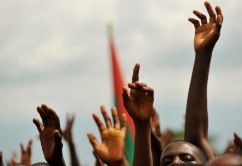Is there a role for Christian organizations in fostering good citizenship in Africa? Two trends in Africa raise this question.
 The first is stalled progress in democratization across the continent. While multiparty democracy and freedom in Africa rose in the early to mid-1990s, many new democracies face corruption, power centralization, weak rule of law, and diminishing accountability and transparency. Leaders limit public speech or manipulate media, while civil society remains cowered or co-opted. What's more, these problems at least partially reflect the underdevelopment of citizenship in Africa. Surveys repeatedly show that citizens throughout Africa are disaffected and disengaged from public life.
The first is stalled progress in democratization across the continent. While multiparty democracy and freedom in Africa rose in the early to mid-1990s, many new democracies face corruption, power centralization, weak rule of law, and diminishing accountability and transparency. Leaders limit public speech or manipulate media, while civil society remains cowered or co-opted. What's more, these problems at least partially reflect the underdevelopment of citizenship in Africa. Surveys repeatedly show that citizens throughout Africa are disaffected and disengaged from public life.
The second trend is the rapidly rising number of African Christian believers. By 2025, over 50% of Africans will be Christian; the explosive growth reflects demographic change, as well as a sense of community provided by churches (particularly in the isolating urban environment), and the high level of spirituality in Africa. Additionally, Christian organizations have become more vocal in national politics. Churches increasingly challenge governments on human rights, poverty, and corruption issues.
Christian engagement in the world should model 'faithful discipleship and responsible citizenship.' Activist churches and citizens can be the expectation, not an aberration. Professor Nico Koopman, University of Stellenbosch
But it seems this political engagement has only scratched the surface, with a focus on national-level politics, engaging national-level church bureaucracies or pastors of mega-churches around broad political topics. What does this engagement mean for the citizenship of millions at the grassroots level—in urban slums or isolated rural villages? How has national-level engagement by Christian organizations pushed the development of the ethos or culture of citizenship?
In August 2014, “Citizen Mobilization in Africa: A Role for Christian Organizations?” brought together six scholars who study religion and politics, six practitioners who engage in citizen mobilization, and two keynote speakers who address related themes in their work at a workshop in Stellenbosch, South Africa. The Calvin Center for Christian Scholarship, the Paul B. Henry Institute, and the Beyers Naude Centre funded the event.
The workshop engaged scholarship on democratization, theologies of public engagement, and social movements. Participants grappled with pressing questions:
- Do Christian organizations in Africa foster citizenship? If so, what form do their activities take? If not, why don’t they?
- How do Christians in Africa understand their rights and responsibilities as citizens?
- What might be long-term positive and negative consequences of Christian involvement in African citizenship mobilization?
Whether you are a scholar who studies religion and politics, or practitioner interested in deepening citizen mobilization efforts within a faith-based organization, you will find much insight from this exploration in South Africa. Join the conversation - and the journey - through the links below in Explore Further.
The Inaugural Workshop
The workshop included:
- Excursions to the Social Justice Coalition, the JL Zwane Centre, and the Treatment Action Campaign
- Discussion of ‘best practices’ for citizen mobilization among faith-based organizations, including listening to a community, discerning its assets, and engaging in a social audit of a specific issue that forms the basis of an action campaign
- Scholarly presentations on faith and citizenship in Africa, including research on public opinion cross-nationally and on mobilization campaigns in specific countries
Contacts

Tracy Kuperus
Professor
Full profile
- Phone: (616) 526-8848
- tracy.kuperus@calvin.edu
- Politics and Economics, Politics
- Hiemenga Hall 453

Amy Patterson
Professor
Full profile
- Phone: 931-598-1547
- aspatter@sewanee.edu